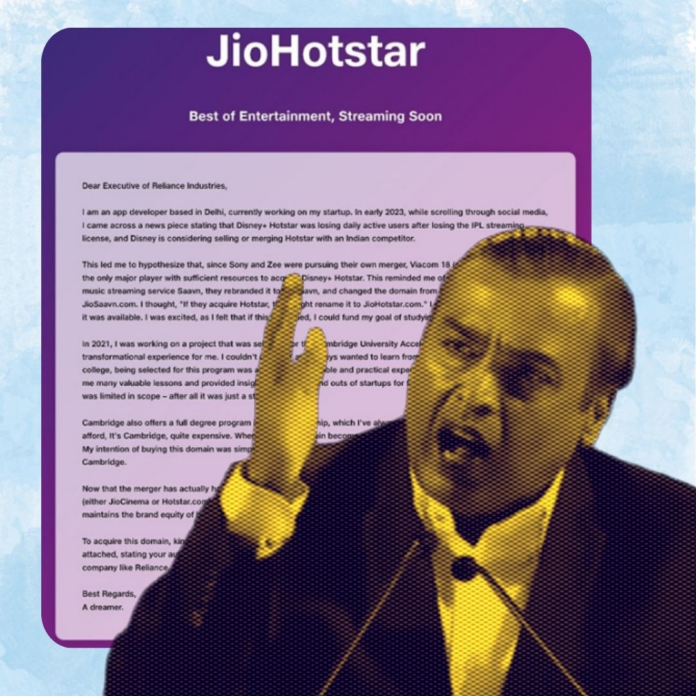In a recent trademark controversy, Reliance Industries is taking legal action against a Delhi-based app developer who registered the domain name ‘JioHotstar,’ anticipating a merger between JioCinema and Disney+ Hotstar. The developer, who hoped to sell the domain to Reliance for ₹1 crore to fund his studies at Cambridge University, now finds himself entangled in a legal dispute with one of India’s largest conglomerates.
The Story Behind ‘JioHotstar’ Domain Registration
The developer reportedly purchased the ‘JioHotstar’ domain with the belief that a merger between JioCinema and Disney+ Hotstar would boost the domain’s value. He aimed to capitalize on the speculation surrounding Jio’s potential partnership with the popular streaming platform, Disney+ Hotstar. Seeing a business opportunity, he approached Reliance with an offer to sell the domain for ₹1 crore, hoping the funds would support his education at Cambridge.
However, this attempt at securing a quick deal has backfired. Instead of buying the domain, Reliance Industries filed a legal complaint against the developer, alleging trademark infringement. The techie now faces significant legal challenges from one of India’s most influential corporations.
Legal Implications and Trademark Infringement Concerns
Reliance’s legal stance revolves around trademark rights, as both “Jio” and “Hotstar” are trademarked names associated with Reliance and Disney, respectively. By combining these names, the domain ‘JioHotstar’ implies an association with both brands, which Reliance claims is a deliberate infringement designed to profit from their established reputation.
Trademark laws are stringent when it comes to protecting brand names, especially in cases where the name could mislead or confuse consumers. Reliance argues that the ‘JioHotstar’ domain creates an impression of an official association between the two brands, which could lead to misunderstandings among users and undermine both companies’ brand integrity.
The developer, however, has defended his actions, stating, “I don’t have the power to stand against Reliance … I don’t feel I infringed any trademark.” He maintains that his intention was not to mislead consumers but to leverage a business opportunity, albeit within a gray area of trademark laws.
The Techie’s Perspective: A Dream to Fund Education
For the app developer, the purchase and attempted sale of the ‘JioHotstar’ domain was part of a larger goal. He intended to use the ₹1 crore from the domain’s sale to fund his higher education at Cambridge University. The developer claims he did not foresee the legal complications that would arise, nor did he intend to challenge Reliance’s branding directly.
While his intention was financially motivated, the legal realities of trademark ownership have become a significant hurdle. With limited financial and legal resources, the developer now faces an uphill battle to defend his domain registration against Reliance’s powerful legal team.

The Rise of Cybersquatting Cases in India
The ‘JioHotstar’ case sheds light on a growing trend of domain-related disputes in India, often referred to as “cybersquatting.” Cybersquatting involves purchasing domain names that are similar to well-known brands, with the hope of selling them for profit. Such cases are on the rise, as individuals aim to exploit potential mergers, product launches, or rebranding by large corporations.
In many countries, including India, trademark laws are being updated to address cybersquatting. Courts often side with established companies in these disputes, particularly if it is proven that the domain name was registered with the intention to profit from a trademarked name. If Reliance successfully argues that ‘JioHotstar’ constitutes cybersquatting, the techie may not only lose the domain but could also face financial penalties.
What This Means for Future Domain Registrations
This case serves as a reminder of the risks associated with purchasing domain names based on speculation of corporate activity. As the tech world evolves and companies explore partnerships and mergers, individuals seeking to capitalize on brand names without authorization may increasingly find themselves facing legal action.
The ‘JioHotstar’ dispute could influence how domain registration and brand protection are handled in India. It reinforces the need for individuals to understand trademark laws and the legal repercussions of cybersquatting, as companies become more vigilant about protecting their intellectual property in the digital age.
The Cost of Challenging Established Brands

The Delhi-based techie’s case with Reliance is a cautionary tale for anyone considering domain registration with the hope of quick profits from brand associations. While the developer aimed to fund his education, the legal complexities surrounding trademarks have placed him in a challenging position. As he now navigates the legal battle with Reliance, the incident highlights the importance of respecting trademark rights in a competitive digital landscape.
Reliance’s swift legal response underscores its commitment to protecting its brand, warning against any misuse or unauthorized association with its trademarked names. This case serves as a lesson for both aspiring entrepreneurs and established companies about the importance of adhering to legal frameworks when dealing with intellectual property.

